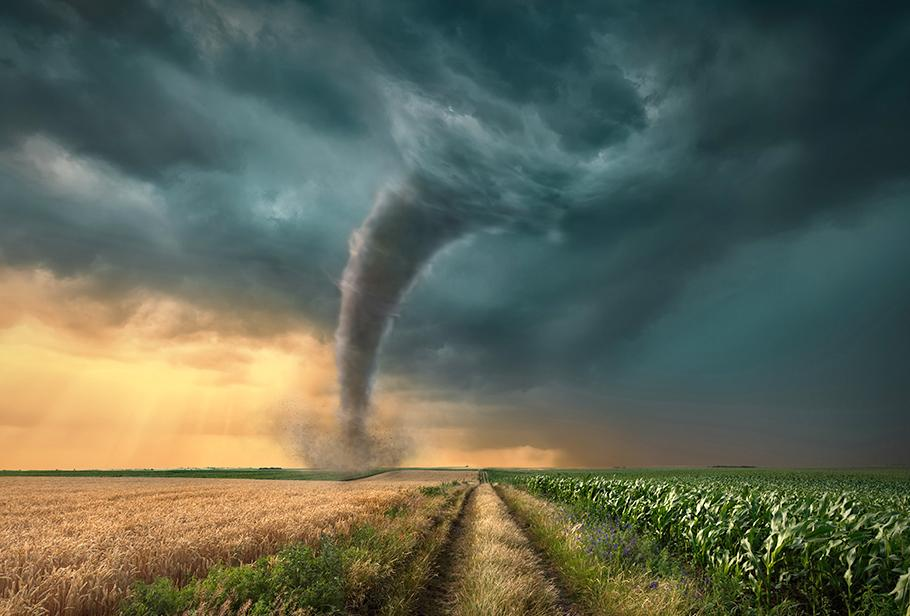
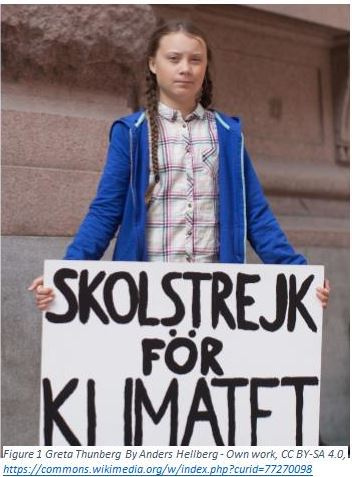
The climate crisis has engaged students with weather and climate like never before. The global movement of climate strikes by school children and the emergence of key youth leaders like Greta Thunberg have shown the passion of students for environmentalism, sustainability and a will to create a greener planet.
Students are more aware of the impacts that changes in our climate system have on their everyday lives. 2020 marked the end of the warmest decade on record1, extreme weather events are impacting areas with increasing frequency and severity all over the globe (and right here in the UK), and some students even acknowledge the need for climate justice.
This poses major questions for educators and teachers:
- Do we provide our students with enough knowledge to engage with these issues?
- Do our students possess understanding of how climate changed in the distant and near past and how that relates to the rate of change at present?
- From a young age do our students understand the basic principles of the weather, how it relates to climate and how it affects them?
- Do students know how weather is measured and information is collected?
- Can students relate global patterns of climate change to the place where they live and the wider UK?
The Royal Meteorological Society has produced “Weather and Climate: A Teachers’ Guide” aimed at early secondary students to try and engage with these questions and promote high quality weather climate teaching and learning. All of the resources discussed in this article are available for free at https://www.metlink.org/weather-and-climate-teachers-guide/
The Royal Meteorological Society
The Royal Meteorological Society works to strengthen the science and raise awareness of the importance of weather and climate, support meteorological professionals and inspire enthusiasts. They believe that:
- All students should leave school with basic weather literacy that allows them to understand the weather that affects them, their leisure activities and the careers they choose to follow;
- Every student should leave school with basic climate literacy that would enable them to engage with the messages put forward by the media or politicians and to make informed decisions about their own opportunities and responsibilities.
This resource is designed to do that for 11-14+ students (KS3 in England and N Ireland).
There are 20 topics/chapters with three suggested paths through the topics, depending on the teaching time available:
- Basic weather path: Weather in our lives, weather measurements, weather and climate, global atmospheric circulation, global climate zones, air masses, pressure and wind and water in the atmosphere
- Climate path: Weather and climate, global atmospheric circulation, global climate zones, past climate change, polar climate, hot deserts, changing global climate, UK climate, changing UK climate, the climate crisis
- Extending weather path: Anticyclones, depressions, microclimates, urban weather, tropical cyclones.
Each chapter in the guide has a double page spread designed to inform teachers of the key ideas within the topic. Accompanying this is the MetLink website which has a full suite of lessons for each chapter/topic designed to guide the students in lessons.
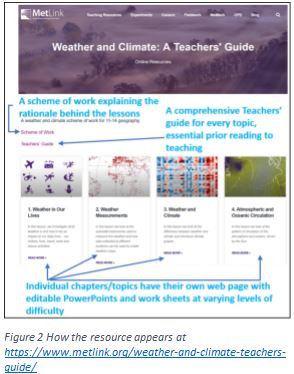
This understanding of weather and climate is fundamental to an understanding of climate change and so this theme has been embedded throughout the teaching resources. At a time when students (amongst others) have been demanding more climate change teaching in schools2+3, it is particularly important to show them the relevance of their classroom learning to one of the most pressing issues of their time.
The Guide also includes many common misconceptions which should be challenged in the classroom – such as “we are not currently in an Ice Age”, “High air pressure occurs because descending air is pushing down on the ground”, “the wind blows from High to Low pressure” and “different parts of the UK experience different air masses”.
There is a progression of knowledge through the topics, supported by review and assessment activities. The resources also progressively develop key geographical skills such as data, mapwork, GIS, fieldwork and critical thinking skills.
There are also Thunks, questions that really challenge the students to question their understanding together with some fantastic “Weatherbots”, designed by Sean Twomey, posing those questions!
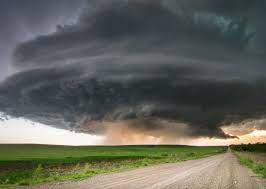
Many of the online teaching resources are available with standard or easier versions, as well as extension or alternative activities. In addition to this, there are assessments, Quizlet sets and Homework activities, all FREE!
The ‘More for Teachers’ resources which support each of the topics in the guide provide background information that should be interesting and useful for all teachers, whatever level they are currently teaching.
All the online resources will be updated and revised regularly.
A teacher and student perspective
During the academic year 2020 to 2021 I ran with two large sections of the resource within my school:
All Year 7 (age 11/ 12) students followed the basic weather path leading to the microclimate and urban weather sections from the extending weather path. This allowed all students to experience microclimate fieldwork too.
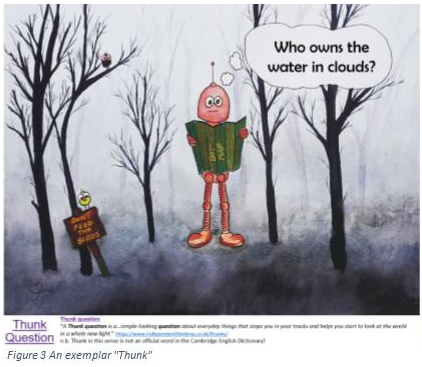
All year 8 (age 12/ 13) students followed the climate path, with a particular focus on climate change.
The resources worked well with the students, and my staff and I even used them on Microsoft Teams as part of our lockdown learning. Here are the opinions of some of my students about the lessons;
"The lessons were engaging and practical despite the coronavirus restrictions. I really enjoyed participating in the Quizlet competitions. Overall, it is clear that a lot of effort went into the planning of these lessons." Adam, Year 7
“I loved learning about weather and climate! The lessons were easy to follow and now I know so much about the weather.” Evangeline, Year 7
“The lessons in lockdown were entertaining and informative. These lessons helped me understand weather and climate better, because we need to know more about our planet.” Adele, Year 7
“I found the lessons interesting. Lots of activities and a lot of information to help us. We learned the material in a good way. It is important to learn about weather and climate because it helps us to learn about our environment and how it works.” Pedro, Year 7
“I loved learning about weather and climate. It will be useful to know this because we will know why it is raining all the time!” Anna, Year 7
“I enjoyed learning about the changing UK climate because it was important to see what is happening to our country and the increasing weather change. It is important to learn about weather in climates because it helps us to know what's happening to the weather and why it's happening.” Ada, Year 7
The pre-prepared lessons give your staff confidence that the materials delivered are reliable and up to date, and the editable nature of the resource means that you can select lessons and adjust them to the age range and needs of your individual classes and students.
The topics areas covered in the resource and a summary of each:
- Weather in our lives – in this section we investigate what weather is and how it has an impact on our daily lives – our clothes, food, travel, work and leisure activities.
- Weather measurements – this chapter looks at the specialist instruments used to measure the weather and how data collected at different locations can be used to create weather maps.
- Weather and Climate – in this section we look at the difference between weather and climate and introduce climate graphs.
- Global Atmospheric and Ocean Circulation- here we look at the circulation of the atmosphere and oceans, driven by the Sun. There is even a board game to accompany the lesson.
- Global Climate Zones – in this lesson, we explore the main climate zones, their link to the global atmospheric circulation and the influence of the oceans.
- Past climate change – a look at how global temperatures have changed over the last 400 000 years and investigate volcanoes and the Milankovitch cycles as the drivers of change, in preparation for a more detailed look at anthropogenic climate change in later lessons.
- Air Masses – this involves an investigation into the characteristics of the major air masses which can affect the British Isles and uses wind roses to investigate common wind directions and associated air masses
- Pressure & wind – this chapter takes a basic look at air pressure, how differences in pressure can lead to air motion (wind) and how rising and sinking air can lead to low and high pressure respectively. We also introduce the Coriolis effect and demonstrate how it can lead to rotating weather systems.
- Water in the Atmosphere – here we focus on cloud formation due to convection, relief and frontal uplift. Students should end the session understanding why it rains!
- Polar Climate - this lesson explores why polar climates are so extreme and has an investigation into how it can be too cold to snow in Antarctica.
- Hot deserts – here we look at the characteristics and locations of hot deserts and the adaptations of animals and vegetation found there.
- Changing global climate – very topical at present, this chapter examines the historical relationship between carbon dioxide (CO2) and global temperature and the greenhouse effect, before moving on to consider future greenhouse gas emission scenarios.
- UK Climate – this chapter revisits climate zones before exploring regional climate differences across the UK and the reasons for them.
- Changing UK Climate – climate change can at times feel a bit abstract to students. To address this, here we use the Central England Temperature record to explore changing UK weather and look at the projected impacts of climate change on the UK.
- The climate crisis – in this lesson we explore the language used to talk about climate change, why some media outlets are now using the term “climate crisis” and look in detail at sea level rise, tipping points and UN climate negotiations.
- Anticyclones – this chapter explores the weather associated with anticyclones in summer and winter and the potential impacts, including winter cold snaps and summer heat waves.
- Depressions – storm Desmond demonstrated the power of mid latitude depressions; this lesson helps the students to understand the causes of low pressure systems and the weather they bring to the UK.
- Microclimates – this chapter area has potential for practical work, with an investigation into the factors that can help create a microclimate and introduce fieldwork opportunities within the school grounds.
- Urban weather – in this topic area we look at how urban areas have an impact on temperature, wind, air quality and precipitation. With climate change being felt profoundly in some cities, this lesson allows students to understand why.
- Tropical cyclones – in this final chapter, we explore the structure, location and names for Tropical cyclones as well as some of their potential impacts.
Alison Smith from Oldham has said of the resource:
“Weather and Climate: A Teachers’ Guide will be really useful to me across all key stages and across multiple topics. An excellent reference tool so that I could check up on my subject knowledge by looking in one place rather than trawling the internet. There is more than enough information within each section for me to plan engaging and challenging lessons. I really like the common misconceptions boxes and the clear learning objectives.”
References